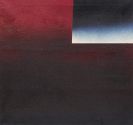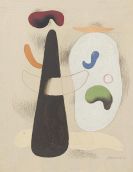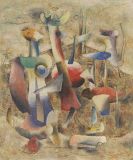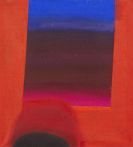
Sam Francis
San Mateo/Kalifornien
1923 -
Santa Monica
1994
The American painter Sam Francis was born in San Mateo, California, on June 25, 1923. He begins to study botany, but soon changes to psychology and medicine, at the University of California in Berkeley in 1941. From 1943 to 1945 he serves in World War II, and suffers a severe spine injury. He returns to painting after a long period of convalescence and goes back to Berkeley, where he studies painting and art history from 1948 to 1950. Among his teachers are Mark Rothko and Clyfford Still.
Sam Francis lives in Paris from 1950-57, where he attends the Académie Léger. Paris is also where his first one-man show takes place in 1952. He meets the artist and critic Michel Tapié, who publishes his influential book "Un art autre" in 1952.
Having been accepted into the vanguard of young European artists, his works are now shown in exhibitions in Paris, London and Bern. His breakthrough in America comes with his participation in the exhibition "Twelve Americans" in the New York Museum of Modern Art in 1956. This period also marks the stylistic change from monochrome complete surface covering compositions to colorful "Color Islands" on the white canvas. Sam Francis' calligraphic characteristic of color application and the lyrical properties of the liquid paint are geared at Asian art, which Sam Francis closely examines. On a journey around the world in 1957 he also visits India, Thailand and Japan, showing works in exhibitions in Tokyo and Osaka. The artist leads a restless life between his principal residence in Paris, Bern and Zurich, where he makes his first large size lithographs in colors. Sam Francis moves back to California in 1962, at first to Santa Monica, where he starts a studio in Venice in 1963.
From the 1960s onward Sam Francis develops his very personal form of spontaneous and gestic drippings. He applies acrylic, oil and watercolors to the image carrier with revolving and splashing motions. The surface of his "Grid Pictures" from the 1970s is covered with a netlike structure. Besides Action Painting, Francis being one of the most important representatives thereof, he also turns to other techniques such as lithography, etching and monotype. His examination of graphic art leads to some interesting experiments in the 1980s. Expressive compositions in several parts, partly with running colors, coin his work during these years. The latest period of artistic creation is determined by commissioned works for large murals.
Sam Francis dies in Santa Monica, California on November 11, 1994.
Would you like to sell a work by Sam Francis?
Infos for seller






